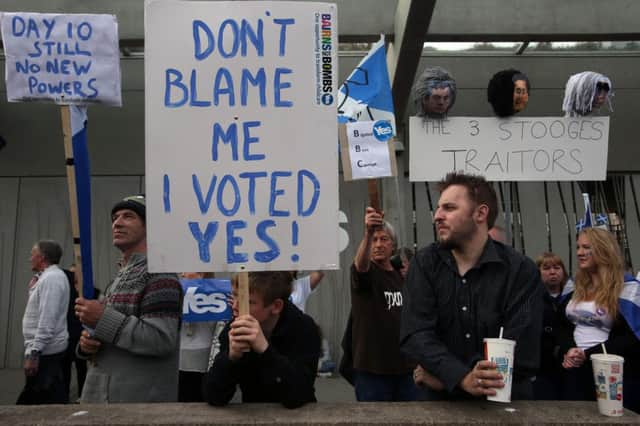Jane Bradley: Sweet dreams aren’t made of this


But is voting No that bad? It is in some people’s eyes, yes.
A friend of mine, over lunch with her workmates – all vocal pro-indy supporters – was recently asked: “Obviously, you voted Yes, didn’t you?” Before she knew what was happening, the words “Of course I did!” came out of her mouth.
Advertisement
Hide AdAdvertisement
Hide AdNow, there’s no going back. She has to join in her friends’ daily pro-independence chat, discuss the merits of Nicola Sturgeon and moan about the difficulties of getting through on SNP HQ’s busy phone lines to become one of the 80-odd thousand fully paid-up party members.
She’s waiting for the day when one of them produces a #wearethe45 badge and she is forced to display it proudly on her jumper.
Not that she is particularly affiliated to the No cause – she admits she swithered at the polling booth. But now, she feels she made the wrong decision – not because she has had a sudden epiphany over the pro-indy movement’s policies, but because she feels like a social pariah.
Her colleagues assume that because she is “one of them” in so many other ways – she is left- leaning, works for an NGO, likes the same books and films and doesn’t dress in a twinset and pearls – she must be a Yes voter.
No voters, they seem to suggest, are another species. Not people they would want to share a lunchtime sandwich with. Definitely not people they would want to consider a friend. She believes her working life would become untenable if they found out the truth – they would immediately cast her out of their group.
But it hasn’t even occurred to them that what they are saying might be considered offensive to some.
This is presumably the kind of attitude which singer Annie Lennox, in a newspaper interview last week, was urging should be stamped out. She said that Scots should “grow up” and set aside their “hatred of the English”. Immediately, she was hit with a huge backlash on her Facebook and Twitter feeds of people telling Aberdeen-born Lennox her to keep her nose out of Scottish business.
“How dare u speak for Scotland. Shame on u!” [sic] wrote one Twitter user.
Advertisement
Hide AdAdvertisement
Hide AdShe later claimed her words had been “blown out of context” and apologised to “anyone who’s been offended by whatever they’ve read in a headline or quote from me”. She didn’t, however, deny the quotes, adding: “It’s not so much what you say, but what can be extracted from it – distorted and magnified to provoke conflict and divisiveness”. Exactly.
In the early days of the independence campaign, it was thought she may have supported nationalism, but her attitude appeared to change as the vote grew closer. She posted a picture of the Union flag, and urged that Scots should be aware that there was a “strong element of risk” to going it alone.
The truth is that only one person knows which way Lennox would have voted, had she still been resident in Aberdeen – and that is Lennox herself.
But, having written a news story about her most recent comments, I also received a number of e-mails on the issue – some demanding to know what Lennox’s position on independence was.
One reader said that he wanted the star’s opinion officially clarified as it “has a significant impact on the referendum itself”. Really? A month post-referendum, the opinion of a singer who doesn’t even live in Scotland still matters? Some people told Lennox that her words meant they would no longer consider themselves to be one of her fans.
Ironically, this is the kind of nonsense she was talking about. She was clearly not suggesting, as so many of the people on her Twitter feed seemed to believe, that every single Scot – or Yes-voting Scot – hates every single English national. But she was talking about a worrying Us vs Them sentiment.
As a nation, we need to stop making assumptions about people based on their politics.
Alex Salmond somehow seemed to bring out that feeling in his subjects. Nicola Sturgeon may be a more unifying influence – while still perfectly legitimately campaigning for independence “within [her] lifetime”. Let’s hope so.